KC Column: Reading Comics
by KC Carlson
I’m writing this column mostly on the road, as my wife and I just spent the last week in Walt Disney World, one of those rare places on the planet that seems to exist just outside of reality, and not always for the best reasons. I won’t go into all the sociopolitical aspects of this – there are plenty of books and websites that discuss this endlessly. But since a certain – usually large – portion of my life for the last 40+ years has involved comic books in some way, it’s interesting to report that, except for a handful of Boom! Studios Muppet Show comic books (and good for Boom!) in the Muppets Store, comic books do not exist in Walt Disney World.
I find this unusual since at one point in the history of comics, Walt Disney comic books, as published by Dell and Gold Key from the 1950s to the 1970s, took up a huge amount of comic book rack space. Two of the Disney comics – Walt Disney’s Comics & Stories and Uncle Scrooge – are often listed in the running for the best comic book series of all time.
But this isn’t a column specifically about Walt Disney comics. It’s just an interesting observation on comics in general and leads to my real topic of how reading comic books has changed over the years, at least for me. The other, more personal, aspect of the WDW trip was that I didn’t read a single comic book in the last seven days. Actually, due to having a house guest for several days before the trip and with all the work that needed to be done before leaving on vacation (you know that old trope), I haven’t read a comic book for about three weeks!
I think that if I was 12 years old and hadn’t read any comics for three weeks, my head would have exploded! I can’t remember a time when I was a kid when I wasn’t reading comic books, although I obviously found time for other things like school work (I was a pretty good student) and television (my brain is still full of mostly useless TV trivia from the 60s). In the enthusiasm of youth, I seldom got more than a few feet out the door after I made comic purchases, plopping down on the concrete steps or curbs surrounding the store and immediately reading the most current JLA or Flash adventure. Even though I was in no competition with anybody to read them (only one other childhood friend also read comics), I had to be the first to read my heroes’ latest adventures.
A lot of my reading was done in my bedroom at night. If it was late – past my bedtime – I was under the covers with a flashlight. Mom could never understand how I went through so many batteries so quickly. If it was earlier in the evening, I would flop down on my stomach on the bed with my head over the edge and read my comics as they lay open on the floor next to the bed. I wasn’t a fanatic about keeping my comics in “mint” condition, but since I was the only one that ever read them, it was pretty easy to keep them all in good shape, especially with this weird reading method of never actually touching them except to turn the pages. I usually fell asleep in this position, and at some point, Mom would come into the room to turn out the light and throw a blanket over me.
This particular reading method also worked great on sofas, with my head over the edge and the comics on the floor. If I tried this today, I would probably snap my spine within minutes.
I also spent a lot of time reading in the back seat of the car, as my grandparents and cousins lived an hour or two away from us and our usual vacation spot – Phelps, Wisconsin – was about a six-hour drive from home. My usual car reading was either DC’s 80-Page Giant Series (usually Batman issues) or the thick Mad Specials, which I never realized were reprints from the regular issues. I preferred the Specials mostly because they had interesting inserts in them (stencils, stamps, the Mad Mobile, cardboard records, and other amazing kid-friendly treasures).
During most of the 60s, I generally bought two comics a week. This was all I could afford on my 25¢ a week allowance (two 12¢ comics and a Bazooka bubble gum for a penny). If I wanted more than that, I had to come up with my own way to find the money. So I did a lot of odd jobs for the neighbors and sold a lot of lemonade on the curb in front of my house. I never actually realized my full earning potential for these projects, because I usually stopped after I had earned the 12¢ I needed for that extra comic.
Also, for a short time, I stopped drinking milk at school. I was given 15¢ a week for milk money, which I palmed and used for additional comics. To make sure I didn’t miss out on the milk, I always came home from school and had a big glass before dinner. This made mom suspicious, and eventually the milk money scam came to a close. I used to sneak the comics into the house under my shirt. The comic I finally got caught with? An issue of Dell’s I Dream of Jeannie. How embarrassing! It wasn’t even a good comic!
I also got some additional money when my mother foolishly gave me money to go buy cigarettes for her. Amazingly, she would give me a note and some cash and, in those days, store clerks would actually sell an 8-year-old packs of cigarettes. I did this exactly once, and felt horrible about it. I hated smoking in general, and hated that Mom smoked. And she knew that I felt this way, as I would occasionally cut her cigarettes in half when she wasn’t looking, or worse, I would fill her full packs of cigarettes with water and put them in the freezer. But, amazingly, she would still give me money and notes to go buy her cigs. At that age, I had no idea what the word “enable” meant, but I somehow realized that I was doing that, and demanded not to do that particular errand. But Mom refused to take no for an answer, and continued to force notes and cash on me for the dirty deed. So I did the only thing I could do – I spent the money on comic books! As you can probably imagine, this source of comic-buying income didn’t last too long. But at least Mom stopped forcing me to buy her cigarettes and eventually she gave up the bad habit altogether!
Back then, it was pretty easy to keep up with most everything I wanted to read, because there just weren’t that many comics coming out. In July 1966 (cover date), DC Comics published just 30 comic books, only 14 of which were traditional superhero comics. (Or 18 if you count Jimmy Olsen, Lois Lane, House of Mystery (Dial H for Hero), and House of Secrets with Eclipso and Prince Ra-Man.) There were also 3 War comics, 3 Romance comics, 3 Adventure comics (Tomahawk, Blackhawk, and Sea Devils), 2 Science Fiction comics, and 1 Humor comic (Adventures of Jerry Lewis).
Marvel published even fewer, just 13 titles. Nine of them were standard superhero titles (including the anthology titles like Tales of Suspense), plus Sgt. Fury, Kid Colt Outlaw, Two Gun Kid, and Millie the Model. Also in 1966, there were lots of titles from Gold Key (mostly kid-friendly cartoon stuff by Disney or Hanna Barbera, but also Tarzan, Korak, Twilight Zone, Turok, Magnus Robot Fighter, Doctor Solar, and others), Archie (teen comics), Harvey (Casper and friends), ACG (horror “mystery” anthologies), and Charlton (mostly mystery, war, and romance comics).
All in all, during this period of comics publishing, there were about 75-100 comics per month (or about 20-25 different comics every week). Today, the numbers are more like 500-600 comics solicited every month and about 100 or so titles a week (although not many comic shops get everything that is published these days). And today, you can’t get any comics for a quarter – I’m not even sure you can get Bazooka for less than a quarter! Hopefully, allowances have also increased from when I was a kid.
I’ve also mentioned before that when I was a kid, I was very lucky to have another comics-reading neighbor and even luckier that he had different tastes than mine. Mark was a Marvel fan, while I concentrated on DCs. Because we were friends, we got to read both as we did occasional lending trades. But Mark eventually stopped reading comics – he got into sports and most likely girls in high school, if I’m remembering right. So I lost my free access to Marvel comics for a while. Time to get another job.
I started working at the local Hardees, flipping burgers. I also kept my paper route, so I was relatively rolling in money during those years. So I started buying Marvels. And I started buying them all at once, starting the month that Fantastic Four #100 came out (July 1970 cover date, for those keeping score at home). Imagine my chagrin when King Kirby left just one issue later!
It was also around this time that I expanded my reading by buying all the DC war books, humor books, Sci-Fi books – pretty much everything except the Romance titles and the teen books (Binky, Scooter, etc.). [I’ve since gone back and gotten most of these genres as well.]
When I was younger, I read everything I bought pretty much as soon as I bought it, mostly because I didn’t buy all that much. As I got older, my comic reading habits changed frequently, and not always for the better. Sometimes these changes were influenced by the comics themselves, but more often it was due to outside influences.
Once I became an adult, making adult wages but without any family expenses, I had a fair amount of discretionary income, much of which I devoted to buying back-issue comics – mostly titles that I couldn’t afford as a kid or those that didn’t appeal to me then. A lot of these purchases were of the Marvel titles I didn’t buy in my youth, as well as the more off-the-wall DC superhero concepts like Doom Patrol or Challengers of the Unknown. I appreciated reading the DC books in big giant gulps, rather than as monthly (or bi-monthly) periodicals. Marvel back issues I could find fairly easily, and since I wasn’t attached to some of the characters when I was young, I didn’t jump into reading the Marvel back issues as quickly as the DCs. I began considering myself a collector more than a reader when it came to some titles, filling in to make my collection complete. Of course, things like Amazing Spider-Man, Fantastic Four, and Avengers were must-reads, but I didn’t read the early X-Men stuff until after the Claremont/Cockrum/Byrne era was well under way. And even today, I still haven’t read some of the earliest Iron Man, Thor, or Sub-Mariner stories. This was the first time I owned comics for a reason other than reading them.
Ironically, the thing that got me the furthest behind in my comic book reading was entering the comic book field itself. Suddenly, I was getting access to lots of deep discounted, “at cost”, or even free comics, and my collection increased seemingly tenfold overnight. Because so much of my early work in comics was in distribution or marketing, I spent a lot of time at conventions, trade shows, and other industry functions. Lots of traveling meant much less free time for reading. To further complicate things, when I was working for specific comic companies, I had to focus most of my attention on that company’s output – although I always tried to keep an eye on what the other guys were doing.
Things reached a head when I started working for DC in 1989. Two major things happened. First, I started putting in very long hours – both in the offices on my editorial duties and being in demand from DC Marketing for more convention and trade show events, due to my ability to talk to folks on both sides of the table (fans as well as retailers and distributors). The second “problem” was the flood of comps (free comics) I was given as part of my employment at DC. For close to 10 years, I received a copy of pretty much everything DC published (statues and expensive toys excluded, but we were given the option to purchase these at cost), which was a very nice employment perk and one which I was very thankful for. It got crazy when we also were given pretty much everything Marvel published (and this was during that excessive time when they were publishing 200-300 titles a month), plus stuff from Image, Dark Horse, and virtually every major comic publisher – far too much stuff to ever be read.
I used to take home a knapsack full of comic books four times a week just to keep up with the flow – something I am sure contributed to my ongoing back problems today. Other DC staffers never took their comps home. They were stacked from floor to ceiling in their offices, and the piles would get higher and thicker every week. Every so often, Paul Levitz would demand that something be done with the comics (they were a fire hazard, after all), and it was usually easier to move the employee to a new office than clean the old one up. Many of my co-workers would read their bundles of comics on the subway while going home and then leave them on the train for others to enjoy. If you were lucky enough to ride the subways in NYC at the right time, you could have amassed a pretty complete comic collection – for free!
On Saturday mornings (when I wasn’t on the road), with cartoons, wrestling, American Gladiators, roller derby, and lord knows what else going on in the background on TV, I would ritualistically flip through (but not actually read) all the week’s books in order to keep up with what DC was doing as well as keeping an eye on the competition. The only Marvel comics that I read continuously for my 10 years at DC were the Avengers (my favorite Marvel title) and whatever Alan Davis wrote or drew. And that’s it. There was no time to read the rest. When I finished looking at the week’s books, I carefully stacked them up in the semi-hidden front room of my apartment – and promptly forgot about them. Years later, when my not-yet-wife Johanna was first visiting my apartment, she was already a little overwhelmed by the amount of visible stuff crammed into my apartment – CDs, videos, books, and stereo equipment. When she discovered the hidden room and saw the thousands of comics within, she began to hyperventilate. Somehow, she eventually learned how to put up with all of my (accumulated) crap. And amazingly, ten years ago, she married me.
Although complaining about free comics seems foolish and downright rude to any number of people, the overwhelming flood of comp comics during those days of excess in the industry, really changed the way I felt about reading and collecting comics. First of all, it completely broke me of the regular weekly reading habit. It also made me feel horrible in that there was always something I wanted to read but never could find the time for and because it instilled the dreaded feeling of never being able to catch up. And it was always frustrating that there now seemed to be a pre-established pecking order to what comics I read. There were there comics I felt I had to read for my job (just to know what was going on) and then there were the comics that I wanted to read, but never had the time for, mostly because I had to read the other ones first.
Before I started working in comics, comic books were my primary hobby – the thing I most liked to do in my spare time. After I started working in comics (where my hobby actually became my job), I quickly realized that I needed to get a new hobby, because as much fun as comics are, I realized that I could not “do” comics 24/7/365 or it would drive me insane (The jury’s still out on that one, actually…) And this is just the first step in going down that road where your dream job becomes a nightmare – because frequently you just can’t get away from it when you occasionally need to.
[Interestingly , the situation regarding comp comics is much different now. When overall comics revenue started to fall in the 1990s, comp copies were often the first things that publishers cut back on. DC employees and key freelancers still get comps, but over at Marvel, their current comp list is much-restricted. And there is no more intercompany trading of comps between DC and Marvel these days. Most of the smaller publishers have also cut back on comp copies – most not offering comps at all, unless you had direct involvement in producing a specific book or title. So, if you break into comics today, don’t expect a flood of free stuff like I just talked about. That era has passed.]
So what happened to my comps? I still have most of the Marvel and DC comps, and slowly but surely I’ve been going back and reading what I missed. There are still 10-year gaps in much of my Marvel (and some DC) reading from that time, most notably the mutant books and all the Spider-Man titles. I am grateful that I missed the Clone Saga, but then again I missed all of that great Dezago and ‘Ringo Spidey stuff as well. Now that some time has passed, I appreciate being able to know, with hindsight, what the best stuff was – and can now prioritize that. I also realize that much of this reading might have to be saved for my eventual “retirement,” because new and interesting stuff is still coming out and it’s occasionally tough to keep up with just that.
I have been trading in some of my comps in order to get stuff that I actually want. Interestingly, I find it easier to trade in the Indy comps from that era – nobody really wants 90s DCs or Marvels (except for specific titles), mostly because they were from that big boom-and-bust period of recent comic history and most retailers still have gobs of them in their backstock. So, I’m trading in my Indy comps – to trade for back-issue Archie comics, mostly from the 60s and 70s. It’s probably not financially sound, but it gets a whole lot of comics that I don’t necessarily want out of our house, and brings in a significantly smaller amount of comics that I actually do want! Score!
These days, there is very little that I read the day that it comes out. I get most of my books from Westfield in a big clump every 4-to-6 weeks. Because of this, I tend to “save up” a number of titles and not read them until a story arc is complete, then read the entire story arc in one reading. So, in effect, I am buying the pamphlets and reading them as if they were trade paperbacks. Yes, it does sound dumb. Here’s some more dumbness on my part: the reason that I don’t stop buying the pamphlets and just get the collection is that in my twisted brain it’s much easier (and cheaper) to store the finished pamphlets in cardboard comic boxes that it is to store the trades on expensive bookshelves. Who said reading comic books had to be rational?
The few books that I do read as they come out – currently Captain America, Blackest Night (and mini-series), Adventure Comics, The Flash mini-series, Secret Warriors (love Nick Fury!), Doom Patrol, and Power Girl (now) – I will most probably re-read when they come to a good stopping place. Just because. I was reading most of the Dark Reign and Avengers stuff as it came out, until there was too much of it, and now I’m behind as I continue to lose interest in the overall story that never seems to move forward. I find that Marvels read better as storyarcs – which is somewhat ironic as Marvel does a much better job of recapping previous issues (on their special recap pages) than DC does. I need a good recap once in awhile, as I’m usually reading about 50-70 different series in various stages at any given time, and so it might be that I’ve actually read well over 100 individual comics between two issues of any given monthly comic, depending on how much free time I have. Recent prime candidates for re-reading in one sitting: Matt Fraction’s incredible cinematic 12-part Iron Man story and JMS’s well-done but long-delayed Thor storyline.
These days, I tend to read comics in big clumps, usually in a 3-4 hour sitting (or until I fall asleep – which happens with more and more regularity the older I get). I usually read by company by mood, as in “I think I’ll read Marvels tonight,” and I will continue to read various Marvel titles until something I read really pisses me off (these days usually any Dark Reign reference). Then I’ll switch to reading DC titles until I read something there that pisses me off. Formerly, that was any Final Crisis reference. These days, it’s either very bad writing or something that makes no sense at all, which is usually the same thing. There’s also a frustrating overall lack of consistency that permeates many of DC’s books, which usually means I’m switching back to Marvel, often before the evening is over.
Sadly, I don’t read as much independent stuff as I would like. There’s a couple of reasons for this. First of all, I love series with much story continuity, as well as the “soap opera” mentality of the never-ending story. These days, that generally means reading DC or Marvel. I’ve been reading some of these characters for over 40 years now, and I’m just not likely to stop at this point. Second, I was a very big supporter of indy comics back in the 1980s and felt kinda betrayed when creators either left their series to other not-as-good talent or series ended prematurely, with no satisfying storyline wrap-up. Reading ongoing indy comics I often liken to finding a great new band that you really get into, and then, after they put out a couple of great albums, they split up. Sure, there are a lot of great stand-alone graphic novels, but unfortunately, I’m just not always that interested in the subject matter. Most of the indy stuff I read today is because Johanna literally shoves it into my hands (like Love and Capes or Owly) or because it’s produced by somebody I used to work with and admire or because it’s funny. (Marvel and especially DC are not always so good with the funny these days.)
When I receive a Westfield box, I sort the comics by publisher and group (Avengers, Batman, etc.) and then read a group of comics at once, usually chosen by whim. I generally prioritize reading the series that complete storylines first, since I want to complete old stories before starting new ones. This is partially because I read and watch so many continuing storylines in comics and on TV (and even movie series) that I occasionally get them confused with each other – especially if I don’t get back to a specific storyline within a reasonable amount of time.
If I see that there are comics in my stack that begin new multi-part stories, I will often set them aside to come back to during my next shipment of books, when I usually get another chapter or two of story. Often, I will just wait until I have all the parts of a story before I start reading. If it’s something that I really want to read right now, I throw caution to the wind and attempt to do an issue-by-issue reading – which is why I often get upset when the last couple of chapters of storylines become long delayed. (I’m talking about you, Ambush Bug, which is actually out this week – sort of) I’ve read literally hundreds of comics in the interim, so I’ve lost track of the smaller details of the story.
Part of this forgetfulness I attribute to age. I like to joke that new story details don’t stick to my brain very well anymore because it’s full of old comics stories and trivia and there just isn’t any room for new stories anymore. More likely, I believe that almost everything is now written and developed to be read as a full-length graphic novel or trade paperback collection and is best read that way. I’d hate to give up on the idea of monthly comic book serials, but I can foresee a time when it just doesn’t make any sense to read them that way. Because the publishers (and most of the creators) are already moving in that direction. It’s been this way for a few years now, actually.
Ultimately, it’s not a decision that I’ll consciously have to make. It’s being made for me. And I think that may be a big reason why I don’t enjoy as many comics as I used to when I was younger.
That and there’s just so much good stuff to read, since there are so many great reprint collections – especially strip collections – of really classic material, much of which hasn’t been previously collected. It really is an embarrassment of riches these days in comics (except for the strain on the wallet!)
KC CARLSON either reads too many comics… or not enough. What day of the week is it?
The vintage covers in this column come from the Grand Comic-Book Database.
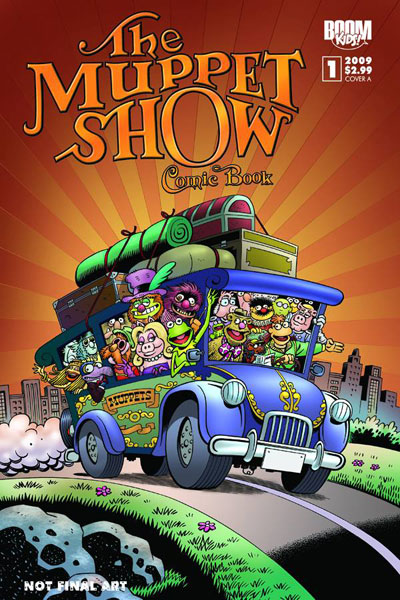
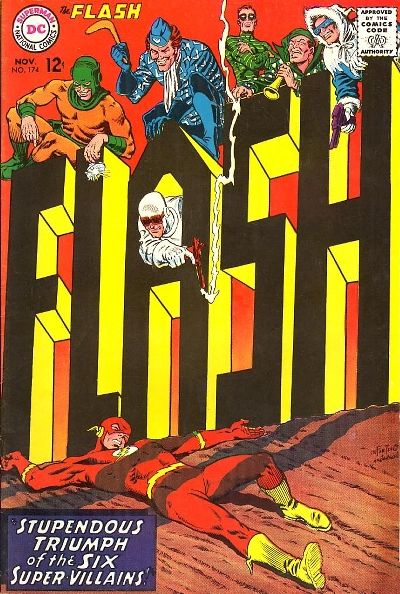
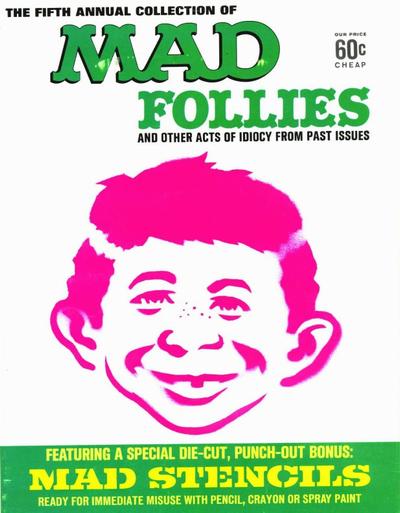
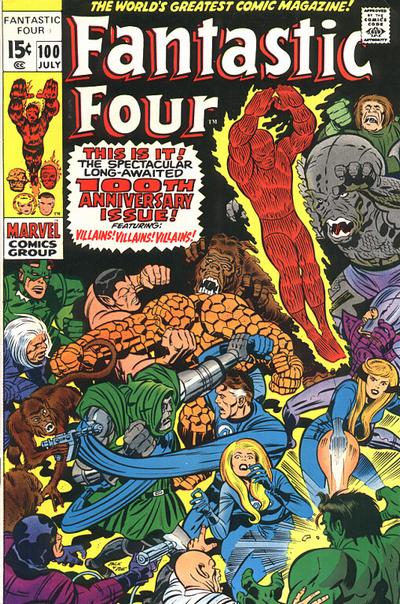
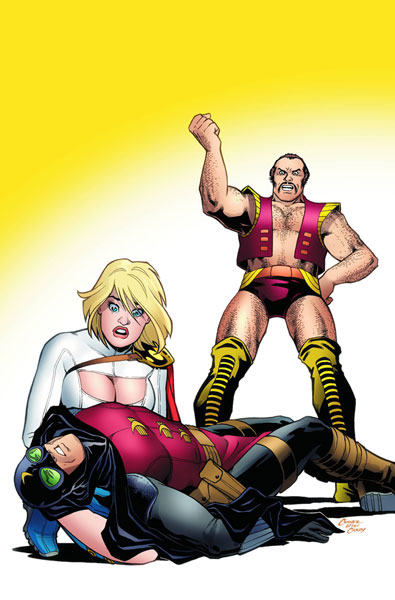
USER COMMENTS
We'd love to hear from you, feel free to add to the discussion!